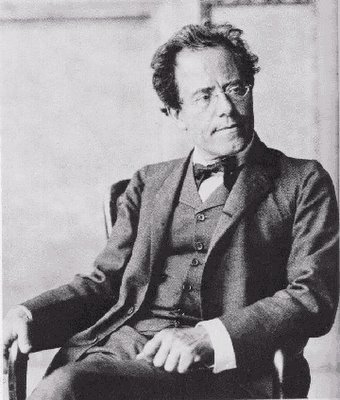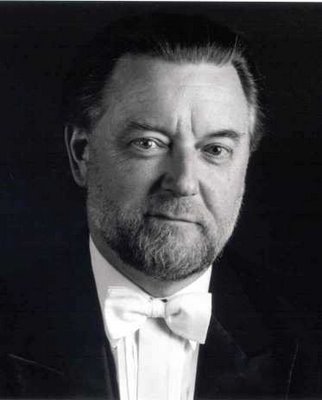
Pittsburgh Symphony Orchestra hasn’t performed Mahler’s “Das Lied von der Erde” or Song of the Earth (SOE) for almost 30 years. Sir Andrew Davis said that was actually William Steinberg’s favorite piece. If fact, Mr. Steinberg chose SOE in his last farewell concert and the music ended at the melancholy singing from mezzo-soprano of “forever… forever.”
Pittsburgh Symphony Orchestra must remember such a moving moment (at least some of the members have gone through Steinberg, Previn, Maazel and Jansons regimes), and the night of Song of the Earth reminded me the livelong dream of contemplation about death and life.
When Mahler speaks in a soft voice, the music is celestial and otherworldly. The motive from the sighing harp echoed by the demurring brass and haunting percussion in the last movement “Parting” consummates all the feelings expressed in the previous movements. Sir Andrew Davis brought out such nuance and delicacy from PSO that the audience stayed silent long after the last music note.
The tenor Jason Collins faced some difficult jobs in singing against roaring orchestra. Mostly I couldn’t hear him clearly due to my seat position. The third movement “Of Youth” showed his vigorous voice and nimble tonality, but Mahler’s SOE is a symphony highlighting mezzo-soprano (or baritone in Bernstein’s case). Jane Irwin won 1991 Decca Kathleen Ferrier Prize and any mezzo-soprano has to face with the legend historical performance by Ferrier. Luckily Jane has a better sound stage and her voice is soft and smooth, with a sense of stillness lingering around, just perfect for decaying stark atmosphere in “The Lonely One in Autumn”. Her singing of the “Parting” was unforgettable. It was not deep sorrow feeling in the end. She instilled the sweet sorrow, as if it resulted from a combination of resignation of inevitable death and a willingness of accepting death as part of life cycle. In the end, she sang the last “Ewig” with tender smiles, and I did wish at that moment it would mean “forever… forever”.
by Ferrier. Luckily Jane has a better sound stage and her voice is soft and smooth, with a sense of stillness lingering around, just perfect for decaying stark atmosphere in “The Lonely One in Autumn”. Her singing of the “Parting” was unforgettable. It was not deep sorrow feeling in the end. She instilled the sweet sorrow, as if it resulted from a combination of resignation of inevitable death and a willingness of accepting death as part of life cycle. In the end, she sang the last “Ewig” with tender smiles, and I did wish at that moment it would mean “forever… forever”.
 The concert proves what I have believed about Mahler. Mahler can hardly be experienced in canned music format. The dynamic, the scale, the orchestration can only be fully enjoyed live. PSO’s Mahler No. 5 almost blew me out of the seat two years ago. Then Barenboim’s last conducting of Mahler in Chicago showed restrains and balance for the same piece. Ferrier’s parting under Bruno Walter’s baton missed the misty echoing from orchestra in DECCA’s CD, it was PSO and Jane Irwin (mezzo soprano) that brought me back to realize the greatness of the masterwork.
The concert proves what I have believed about Mahler. Mahler can hardly be experienced in canned music format. The dynamic, the scale, the orchestration can only be fully enjoyed live. PSO’s Mahler No. 5 almost blew me out of the seat two years ago. Then Barenboim’s last conducting of Mahler in Chicago showed restrains and balance for the same piece. Ferrier’s parting under Bruno Walter’s baton missed the misty echoing from orchestra in DECCA’s CD, it was PSO and Jane Irwin (mezzo soprano) that brought me back to realize the greatness of the masterwork.
Pittsburgh Symphony Orchestra must remember such a moving moment (at least some of the members have gone through Steinberg, Previn, Maazel and Jansons regimes), and the night of Song of the Earth reminded me the livelong dream of contemplation about death and life.
When Mahler speaks in a soft voice, the music is celestial and otherworldly. The motive from the sighing harp echoed by the demurring brass and haunting percussion in the last movement “Parting” consummates all the feelings expressed in the previous movements. Sir Andrew Davis brought out such nuance and delicacy from PSO that the audience stayed silent long after the last music note.
The tenor Jason Collins faced some difficult jobs in singing against roaring orchestra. Mostly I couldn’t hear him clearly due to my seat position. The third movement “Of Youth” showed his vigorous voice and nimble tonality, but Mahler’s SOE is a symphony highlighting mezzo-soprano (or baritone in Bernstein’s case). Jane Irwin won 1991 Decca Kathleen Ferrier Prize and any mezzo-soprano has to face with the legend historical performance
 by Ferrier. Luckily Jane has a better sound stage and her voice is soft and smooth, with a sense of stillness lingering around, just perfect for decaying stark atmosphere in “The Lonely One in Autumn”. Her singing of the “Parting” was unforgettable. It was not deep sorrow feeling in the end. She instilled the sweet sorrow, as if it resulted from a combination of resignation of inevitable death and a willingness of accepting death as part of life cycle. In the end, she sang the last “Ewig” with tender smiles, and I did wish at that moment it would mean “forever… forever”.
by Ferrier. Luckily Jane has a better sound stage and her voice is soft and smooth, with a sense of stillness lingering around, just perfect for decaying stark atmosphere in “The Lonely One in Autumn”. Her singing of the “Parting” was unforgettable. It was not deep sorrow feeling in the end. She instilled the sweet sorrow, as if it resulted from a combination of resignation of inevitable death and a willingness of accepting death as part of life cycle. In the end, she sang the last “Ewig” with tender smiles, and I did wish at that moment it would mean “forever… forever”. The concert proves what I have believed about Mahler. Mahler can hardly be experienced in canned music format. The dynamic, the scale, the orchestration can only be fully enjoyed live. PSO’s Mahler No. 5 almost blew me out of the seat two years ago. Then Barenboim’s last conducting of Mahler in Chicago showed restrains and balance for the same piece. Ferrier’s parting under Bruno Walter’s baton missed the misty echoing from orchestra in DECCA’s CD, it was PSO and Jane Irwin (mezzo soprano) that brought me back to realize the greatness of the masterwork.
The concert proves what I have believed about Mahler. Mahler can hardly be experienced in canned music format. The dynamic, the scale, the orchestration can only be fully enjoyed live. PSO’s Mahler No. 5 almost blew me out of the seat two years ago. Then Barenboim’s last conducting of Mahler in Chicago showed restrains and balance for the same piece. Ferrier’s parting under Bruno Walter’s baton missed the misty echoing from orchestra in DECCA’s CD, it was PSO and Jane Irwin (mezzo soprano) that brought me back to realize the greatness of the masterwork.
No comments:
Post a Comment